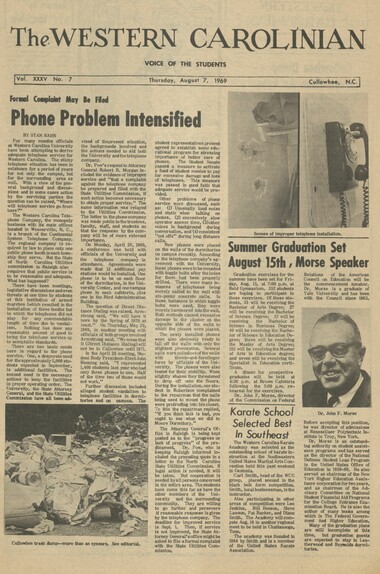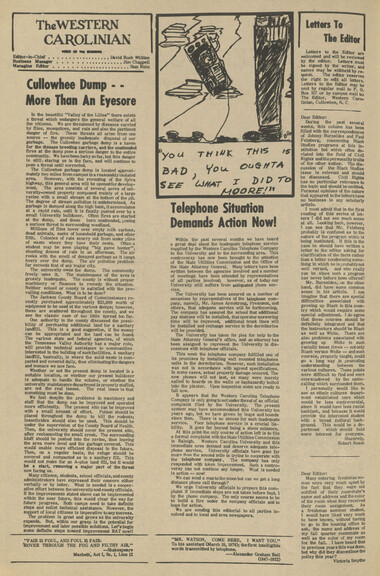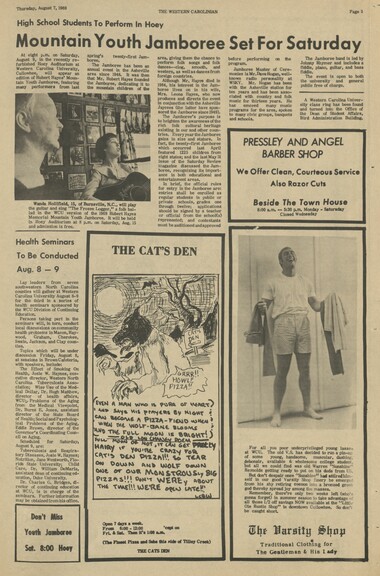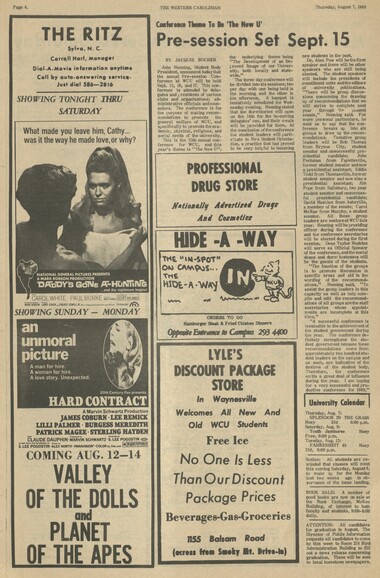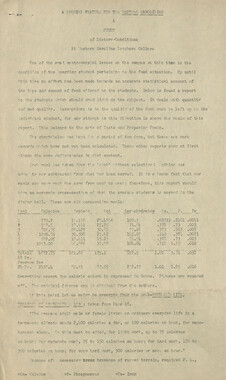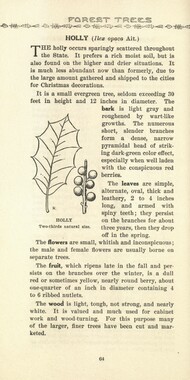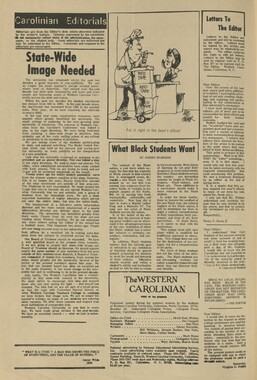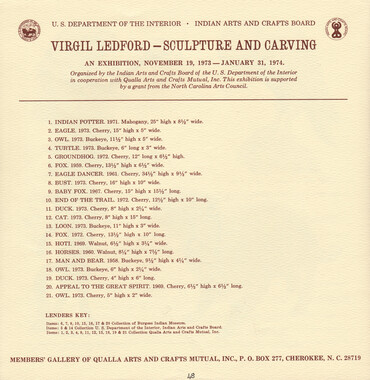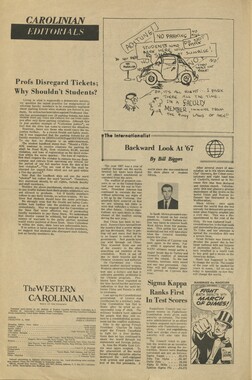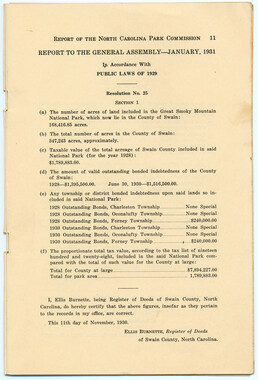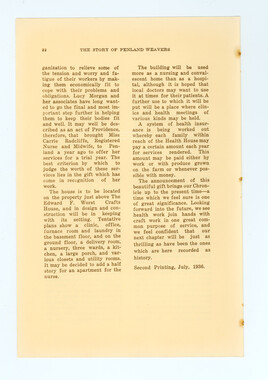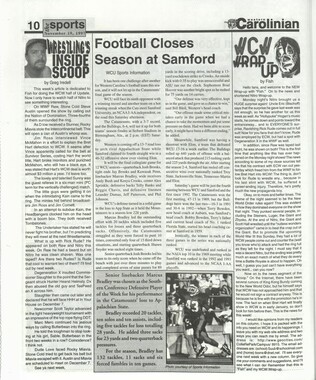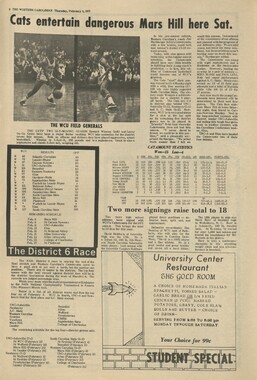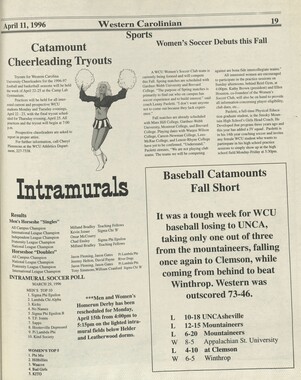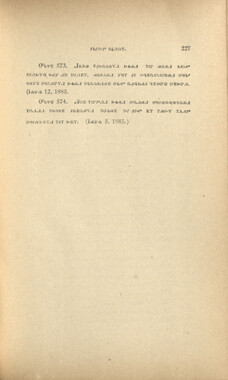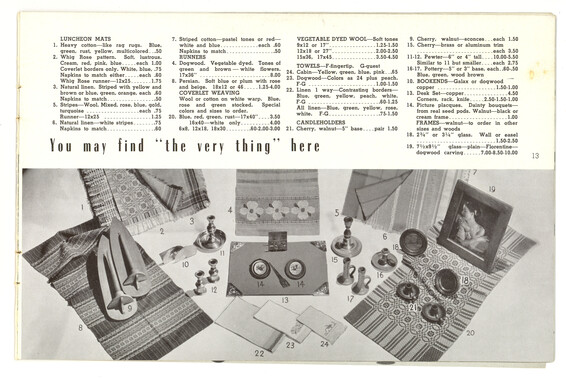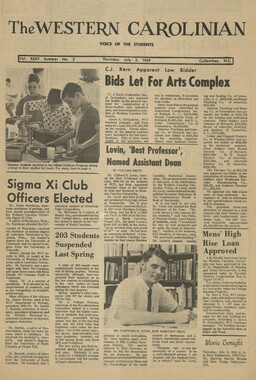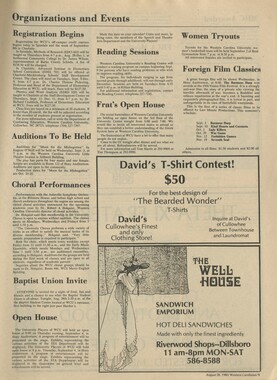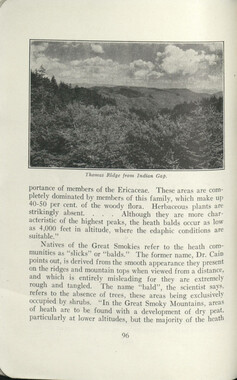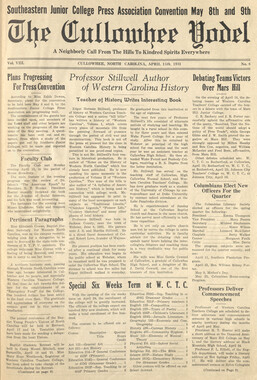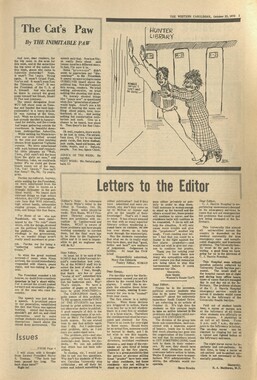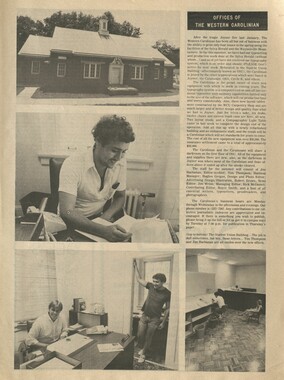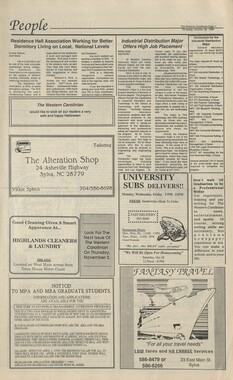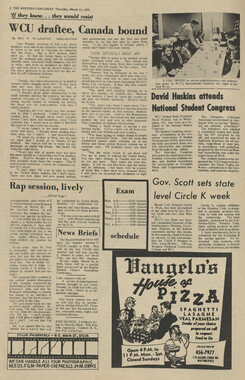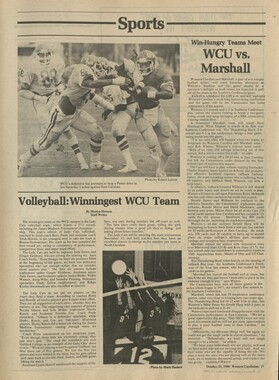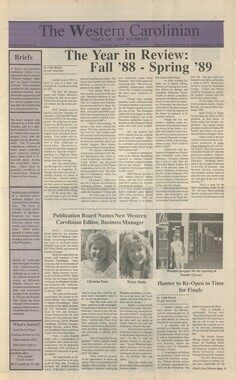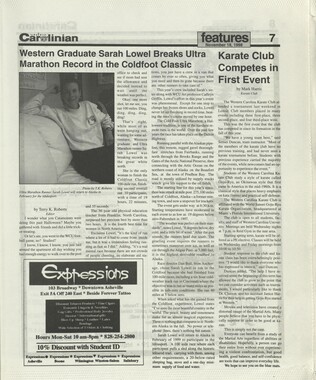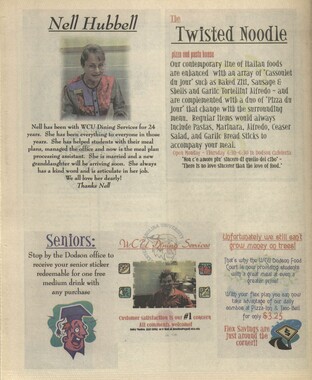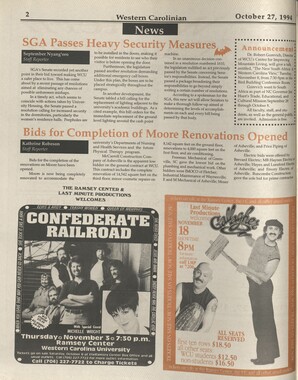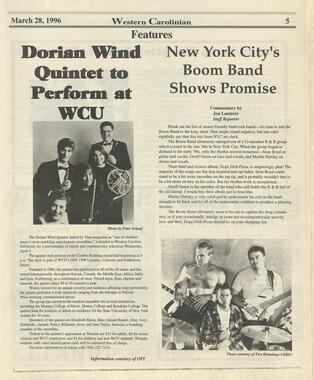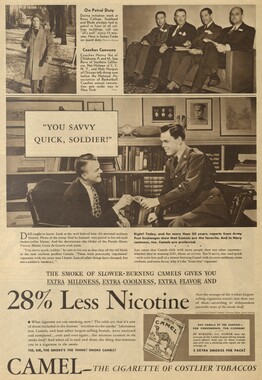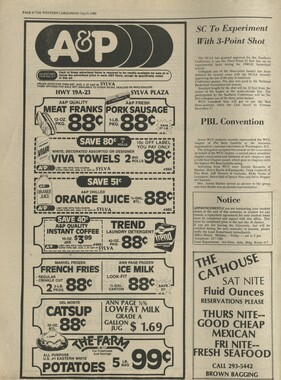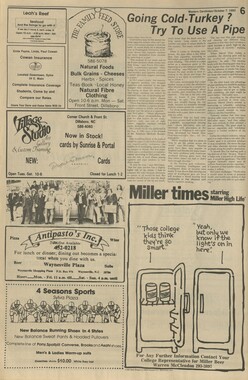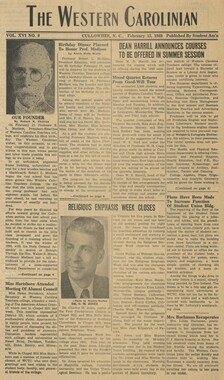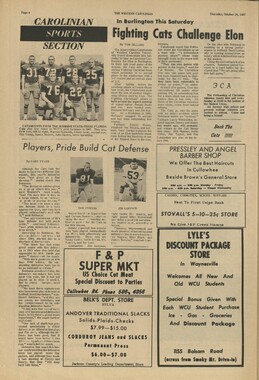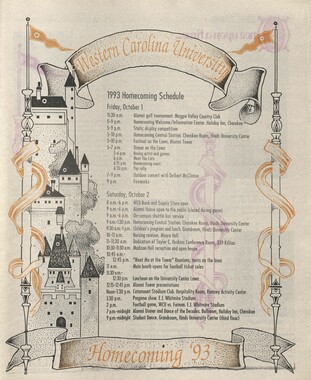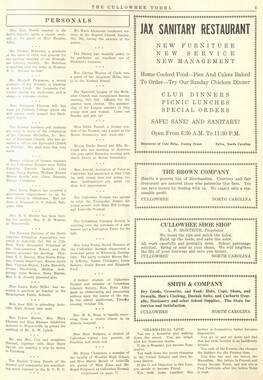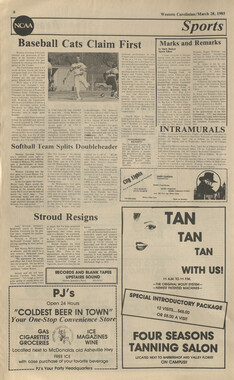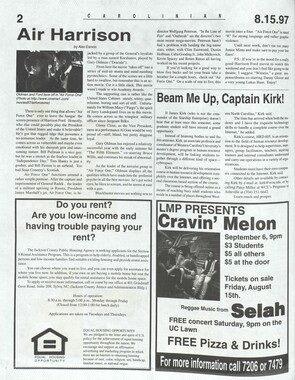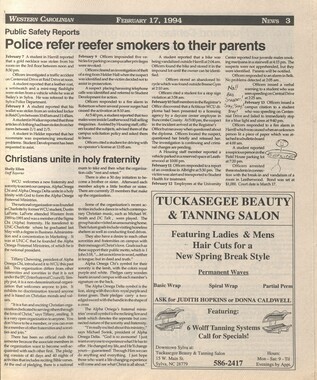Western Carolina University (20)
View all
- Canton Champion Fibre Company (2308)
- Cherokee Traditions (293)
- Civil War in Southern Appalachia (165)
- Craft Revival (1942)
- Great Smoky Mountains - A Park for America (2767)
- Highlights from Western Carolina University (430)
- Horace Kephart (941)
- Journeys Through Jackson (154)
- LGBTQIA+ Archive of Jackson County (26)
- Oral Histories of Western North Carolina (314)
- Picturing Appalachia (6772)
- Stories of Mountain Folk (413)
- Travel Western North Carolina (160)
- Western Carolina University Fine Art Museum Vitreograph Collection (129)
- Western Carolina University Herbarium (92)
- Western Carolina University: Making Memories (708)
- Western Carolina University Publications (2283)
- Western Carolina University Restricted Electronic Theses and Dissertations (146)
- Western North Carolina Regional Maps (71)
- World War II in Southern Appalachia (131)
University of North Carolina Asheville (6)
View all
- Allanstand Cottage Industries (62)
- Appalachian National Park Association (53)
- Bennett, Kelly, 1890-1974 (1388)
- Berry, Walter (76)
- Brasstown Carvers (40)
- Carver, George Washington, 1864?-1943 (26)
- Cathey, Joseph, 1803-1874 (1)
- Champion Fibre Company (233)
- Champion Paper and Fibre Company (297)
- Cherokee Indian Fair Association (16)
- Cherokee Language Program (22)
- Crowe, Amanda (40)
- Edmonston, Thomas Benton, 1842-1907 (7)
- Ensley, A. L. (Abraham Lincoln), 1865-1948 (275)
- Fromer, Irving Rhodes, 1913-1994 (70)
- George Butz (BFS 1907) (46)
- Goodrich, Frances Louisa (120)
- Grant, George Alexander, 1891-1964 (96)
- Heard, Marian Gladys (60)
- Kephart, Calvin, 1883-1969 (15)
- Kephart, Horace, 1862-1931 (313)
- Kephart, Laura, 1862-1954 (39)
- Laney, Gideon Thomas, 1889-1976 (439)
- Masa, George, 1881-1933 (61)
- McElhinney, William Julian, 1896-1953 (44)
- Niggli, Josephina, 1910-1983 (10)
- North Carolina Park Commission (105)
- Osborne, Kezia Stradley (9)
- Owens, Samuel Robert, 1918-1995 (11)
- Penland Weavers and Potters (36)
- Roberts, Vivienne (15)
- Roth, Albert, 1890-1974 (142)
- Schenck, Carl Alwin, 1868-1955 (1)
- Sherrill's Photography Studio (2565)
- Southern Highland Handicraft Guild (127)
- Southern Highlanders, Inc. (71)
- Stalcup, Jesse Bryson (46)
- Stearns, I. K. (213)
- Thompson, James Edward, 1880-1976 (226)
- United States. Indian Arts and Crafts Board (130)
- USFS (683)
- Vance, Zebulon Baird, 1830-1894 (1)
- Weaver, Zebulon, 1872-1948 (58)
- Western Carolina College (230)
- Western Carolina Teachers College (282)
- Western Carolina University (1794)
- Western Carolina University. Mountain Heritage Center (18)
- Whitman, Walt, 1819-1892 (10)
- Wilburn, Hiram Coleman, 1880-1967 (73)
- Williams, Isadora (3)
- Cain, Doreyl Ammons (0)
- Crittenden, Lorraine (0)
- Rhodes, Judy (0)
- Smith, Edward Clark (0)
- Appalachian Region, Southern (2399)
- Asheville (N.C.) (1917)
- Avery County (N.C.) (26)
- Blount County (Tenn.) (161)
- Buncombe County (N.C.) (1671)
- Cherokee County (N.C.) (283)
- Clay County (N.C.) (555)
- Graham County (N.C.) (233)
- Great Smoky Mountains National Park (N.C. and Tenn.) (510)
- Haywood County (N.C.) (3522)
- Henderson County (N.C.) (70)
- Jackson County (N.C.) (4692)
- Knox County (Tenn.) (25)
- Knoxville (Tenn.) (12)
- Lake Santeetlah (N.C.) (10)
- Macon County (N.C.) (420)
- Madison County (N.C.) (211)
- McDowell County (N.C.) (39)
- Mitchell County (N.C.) (132)
- Polk County (N.C.) (35)
- Qualla Boundary (981)
- Rutherford County (N.C.) (76)
- Swain County (N.C.) (2113)
- Transylvania County (N.C.) (247)
- Watauga County (N.C.) (12)
- Waynesville (N.C.) (73)
- Yancey County (N.C.) (72)
- Aerial Photographs (3)
- Aerial Views (60)
- Albums (books) (4)
- Articles (1)
- Artifacts (object Genre) (228)
- Bibliographies (1)
- Biography (general Genre) (2)
- Cards (information Artifacts) (38)
- Clippings (information Artifacts) (191)
- Crafts (art Genres) (622)
- Depictions (visual Works) (21)
- Design Drawings (1)
- Drawings (visual Works) (184)
- Envelopes (73)
- Facsimiles (reproductions) (1)
- Fiction (general Genre) (4)
- Financial Records (12)
- Fliers (printed Matter) (67)
- Glass Plate Negatives (381)
- Guidebooks (2)
- Internegatives (10)
- Interviews (812)
- Land Surveys (102)
- Letters (correspondence) (1013)
- Manuscripts (documents) (619)
- Maps (documents) (177)
- Memorandums (25)
- Minutes (administrative Records) (59)
- Negatives (photographs) (5835)
- Newsletters (1285)
- Newspapers (2)
- Occupation Currency (1)
- Paintings (visual Works) (1)
- Pen And Ink Drawings (1)
- Periodicals (193)
- Personal Narratives (10)
- Photographs (12976)
- Plans (maps) (1)
- Poetry (7)
- Portraits (1960)
- Postcards (329)
- Programs (documents) (151)
- Publications (documents) (2237)
- Questionnaires (65)
- Scrapbooks (282)
- Sheet Music (2)
- Slides (photographs) (402)
- Songs (musical Compositions) (2)
- Sound Recordings (796)
- Specimens (92)
- Speeches (documents) (15)
- Tintypes (photographs) (8)
- Transcripts (322)
- Video Recordings (physical Artifacts) (23)
- Vitreographs (129)
- Text Messages (0)
- A.L. Ensley Collection (275)
- Appalachian Industrial School Records (7)
- Appalachian National Park Association Records (336)
- Axley-Meroney Collection (2)
- Bayard Wootten Photograph Collection (20)
- Bethel Rural Community Organization Collection (7)
- Blumer Collection (5)
- C.W. Slagle Collection (20)
- Canton Area Historical Museum (2110)
- Carlos C. Campbell Collection (282)
- Cataloochee History Project (65)
- Cherokee Studies Collection (4)
- Daisy Dame Photograph Album (5)
- Daniel Boone VI Collection (1)
- Doris Ulmann Photograph Collection (112)
- Elizabeth H. Lasley Collection (1)
- Elizabeth Woolworth Szold Fleharty Collection (4)
- Frank Fry Collection (95)
- George Masa Collection (173)
- Gideon Laney Collection (452)
- Hazel Scarborough Collection (2)
- Hiram C. Wilburn Papers (28)
- Historic Photographs Collection (236)
- Horace Kephart Collection (861)
- Humbard Collection (33)
- Hunter and Weaver Families Collection (1)
- I. D. Blumenthal Collection (4)
- Isadora Williams Collection (4)
- Jesse Bryson Stalcup Collection (47)
- Jim Thompson Collection (224)
- John B. Battle Collection (7)
- John C. Campbell Folk School Records (80)
- John Parris Collection (6)
- Judaculla Rock project (2)
- Kelly Bennett Collection (1407)
- Love Family Papers (11)
- Major Wiley Parris Civil War Letters (3)
- Map Collection (12)
- McFee-Misemer Civil War Letters (34)
- Mountain Heritage Center Collection (4)
- Norburn - Robertson - Thomson Families Collection (44)
- Pauline Hood Collection (7)
- Pre-Guild Collection (2)
- Qualla Arts and Crafts Mutual Collection (12)
- R.A. Romanes Collection (681)
- Rosser H. Taylor Collection (1)
- Samuel Robert Owens Collection (94)
- Sara Madison Collection (144)
- Sherrill Studio Photo Collection (2558)
- Smoky Mountains Hiking Club Collection (616)
- Stories of Mountain Folk - Radio Programs (374)
- The Reporter, Western Carolina University (510)
- Venoy and Elizabeth Reed Collection (16)
- WCU Gender and Sexuality Oral History Project (32)
- WCU Mountain Heritage Center Oral Histories (25)
- WCU Oral History Collection - Mountain People, Mountain Lives (71)
- WCU Students Newspapers Collection (1744)
- Western North Carolina Tomorrow Black Oral History Project (69)
- William Williams Stringfield Collection (2)
- Zebulon Weaver Collection (109)
- African Americans (390)
- Appalachian Trail (35)
- Artisans (521)
- Cherokee art (84)
- Cherokee artists -- North Carolina (10)
- Cherokee language (21)
- Cherokee pottery (101)
- Cherokee women (208)
- Church buildings (167)
- Civilian Conservation Corps (U.S.) (110)
- College student newspapers and periodicals (1830)
- Dams (103)
- Dance (1023)
- Education (222)
- Floods (61)
- Folk music (1015)
- Forced removal, 1813-1903 (2)
- Forest conservation (220)
- Forests and forestry (1058)
- Gender nonconformity (4)
- Great Smoky Mountains National Park (N.C. and Tenn.) (181)
- Hunting (38)
- Landscape photography (10)
- Logging (103)
- Maps (84)
- Mines and mineral resources (8)
- North Carolina -- Maps (18)
- Paper industry (38)
- Postcards (255)
- Pottery (135)
- Railroad trains (71)
- Rural electrification -- North Carolina, Western (3)
- School integration -- Southern States (2)
- Segregation -- North Carolina, Western (5)
- Slavery (5)
- Sports (452)
- Storytelling (245)
- Waterfalls -- Great Smoky Mountains (N.C. and Tenn.) (66)
- Weaving -- Appalachian Region, Southern (280)
- Wood-carving -- Appalachian Region, Southern (328)
- World War, 1939-1945 (173)
Western Carolinian Volume 35 Number 07, August, 8, 1969
Item
Item’s are ‘child’ level descriptions to ‘parent’ objects, (e.g. one page of a whole book).
-
-
TheWESTERN CAROLINIAN VOICE OF THE STUDENTS Vol. XXXV No. 7 Thursday, August 7, 1969 Cullowhee, N.C. Formal Complaint May Be Filed Phone Problem Intensified BY STAN RAHN For many months officials at Western Carolina University have been attempting to derive adequate telephone service for Western Carolina. The sticky telephone situation has been in existence for a period of years for not only the campus, but for the surrounding area as well. With a view of the general background and discussions and in some cases action by the servicing parties the question can be raised, "Where will telephone service go from here?" The Western Carolina Telephone Company, the monopoly business with its main offices located in Weaverville, N„ C, is a branch of the Continental System Telephone Company. The regional company is required by law to place only one public phone booth in each township they serve. But the State of North Carolina Utilities commission in Raleigh also requires that public service is to be reasonable and adequate. What has happened? There have been meetings, legislative discussions and even threats at one time by students at this institution of armed marches (which resulted in the installation of three booths but in which the telephones did not stay for any commendable length of time due to vandalism. Nothing has done any reasonable amount of good to bring the telephone service up to acceptable standards. There are two basic needs here in regard to the phone service. One, a desperate need for the approximately 5,000 students expected in September, is additional facilities. The second need is the necessary actions to keep the facilities in proper operating order. The University, the State Attorney General, and the State Utilities Commission have all been ad vised of thepresent situation, the backgrounds involved and the actions needed to aid both the University and tiie telephone company. Dr. Pow'srequesttoAttorney General Robert B. Morgan included the evidence of improper service and "that a complaint against the telephone company be prepared and filed with the State Utilities Commission, if such action becomes necessary to obtain proper service." The same information was relayed to the Utilities Commission. The letter to the phone company was made public to the trustees, faculty, staff, and students so that the response by the company will be of more relevant importance. On Monday, April 28, 1969, a conference was held with officials of the University and the telephone company in attendance. Agreements were made that 12 additional pay stations would be installed. One phone is to be on each floor of the dormitories, in the University Center, and one campus phone in each cafeteria, plus one in the Bird Administration Building. The question of Direct Distance Dialing was raised. Armstrong said, "We will have it here by the Spring of 1970 at least," On Thursday, May 29, 1969, in another meeting with officials of both groups involved Armstrong said, "We mean that it (Direct Distance Dialing) will not be to Cullowhee until 1971. In the April 28 meeting, Student Body President-Elect John Henning said, "I represented 1,400 students last year who had only three phones to use. Half of the time two of those would not work." Further discussion included alleged student vandalism to telephone facilities in dormitories and on campus. The Cullowhee trash dump—more than an eyesore. See editorial. student representatives present agreed to establish some educational program for stressing importance of better care of phones. The Student Senate passed a measure to activate a fund of student monies to pay for excessive damage and loss of telephones. This measure was passed in good faith that adequate service would be provided. Other problems of phone service were discussed, such as: (1) Unusually loud noise and static when talking on phones, (2) excessively slow operator answer time, (3) other voices in background during conversation, and (4) consistent "cut offs" during long distance calls. New phones were placed on the walls of the dormitories on campus recently. According to the telephone company's agreement with the University, these phones were to be mounted with toggle bolts after the holes for them had been properly drilled. There were many instances of telephones being merely nailed to the wall with six-penny concrete nails. In those instances in which toggle bolts were used, they were merely hammered into the wall. Both methods caused excessive damage to the plaster on the opposite side of the walls to which the phones were placed. The newly installed phones were also obviously ready to fall off the walls with only the slightest provocation. Several nails were pulled out of the walls with thumb-and-forefinger force by officials of the University. The phones were also tested for their stability. When slightly shaken they threatened to drop off onto the floors, During the installation, one student in Robertson complained to the repairman that the nails being used to mount the phone were protruding into his closet. To this the repairman replied, "If you think this is bad, you ought to see what we did to Moore Dormitory." The Attorney General's Office in Raleigh is being kept posted as to the "progress or lack of progress" of the predicament. Dr. Pow, who is keeping Raleigh informed included the preceding quote in a letter to the North Carolina State Utilities Commission. If legal action is needed, it will be taken. But cooperation is needed by all persons concerned in the entire area. The students have come this far as have the other members of the University and the surrounding community. They are willing to go further and persevere If reasonable response is given by the telephone company. The deadline for improved service is Sept 1. Then, if service is not improved, the State Attorney General's office might be asked to file a formal complaint with the State Utilities Commission. Scenes of improper telephone installation. Summer Graduation Set August 15th, Morse Speaker Graduation exercises for the summer have been set for Friday, Aug. 15, at 7:00 p.m. at Reid Gymnasium. 352 students are hoping to participate in these exercises. Of these students, 33 will be receiving the Bachelor of Arts Degree; 27 will be receiving the Bachelor of Science Degree; 57 will be receiving the Bachelor of Science in Business Degree; 40 will be receiving the Bachelor of Science in Education Degree; three will be receiving the Master of Arts Degree; 185 will be receivingthe Master of Arts in Education degree; and seven will be receiving the Specialist in Education certificate. A dinner for prospective graduates will be held at 4:30 p.m. at Brown Cafeteria following the 3:00 p.m. rehearsal for the exercises. Dr. John F. Morse, director of the Commission on Federal Karate School Selected Best In Southeast The Western Carolina Karate Academy was selected as the outstanding school of karate instruction at the Southeastern United States Martial Arts Convention held this past weekend in Gastonia. Carl Smith, head of the WCU group, placed second in the black belt form competition. Smith, local businessman, is the instructor. Also participating in other areas of competition were Lee Jenkins, Bill Henson, Steve Lawson, Pat Barker, and Diane Smith. The Academy wUl compete Aug. 16 in another regional meet to be held in Chattanooga, Tenn. The academy was founded in 1964 by Smith and is a member of the United States Karate Association. Relations of the American Council on Education will be the commencement speaker. Dr. Morse is a graduate of Yale University and has been with the Council since 1963. Dr. John F, Morse Before accepting this position, he was director of admissions at Renssellaer Polytechnic Institute in Troy, New York. Dr, Morse is an outstanding authority on student assistance programs and has served as the director of the National Defense Student Loan Program in the United States Office of Education in 1959-60. He also served as chairman of the New York Higher Education Assistance corporation for two years, and as chairman of the Advisory Committee on National Student Financial Aid Programs for the College Entrance Examination Board. He is also the author of many books among which is The Federal Government And Higher Education. Many of the graduation plans are still incomplete at this time, but graduation guests are expected to stay in Lea- therwood and Reynolds dormitories.
Object
Object’s are ‘parent’ level descriptions to ‘children’ items, (e.g. a book with pages).
-
The Western Carolinian is Western Carolina University’s student-run newspaper. The paper was published as the Cullowhee Yodel from 1924 to 1931 before changing its name to The Western Carolinian in 1933.
-
